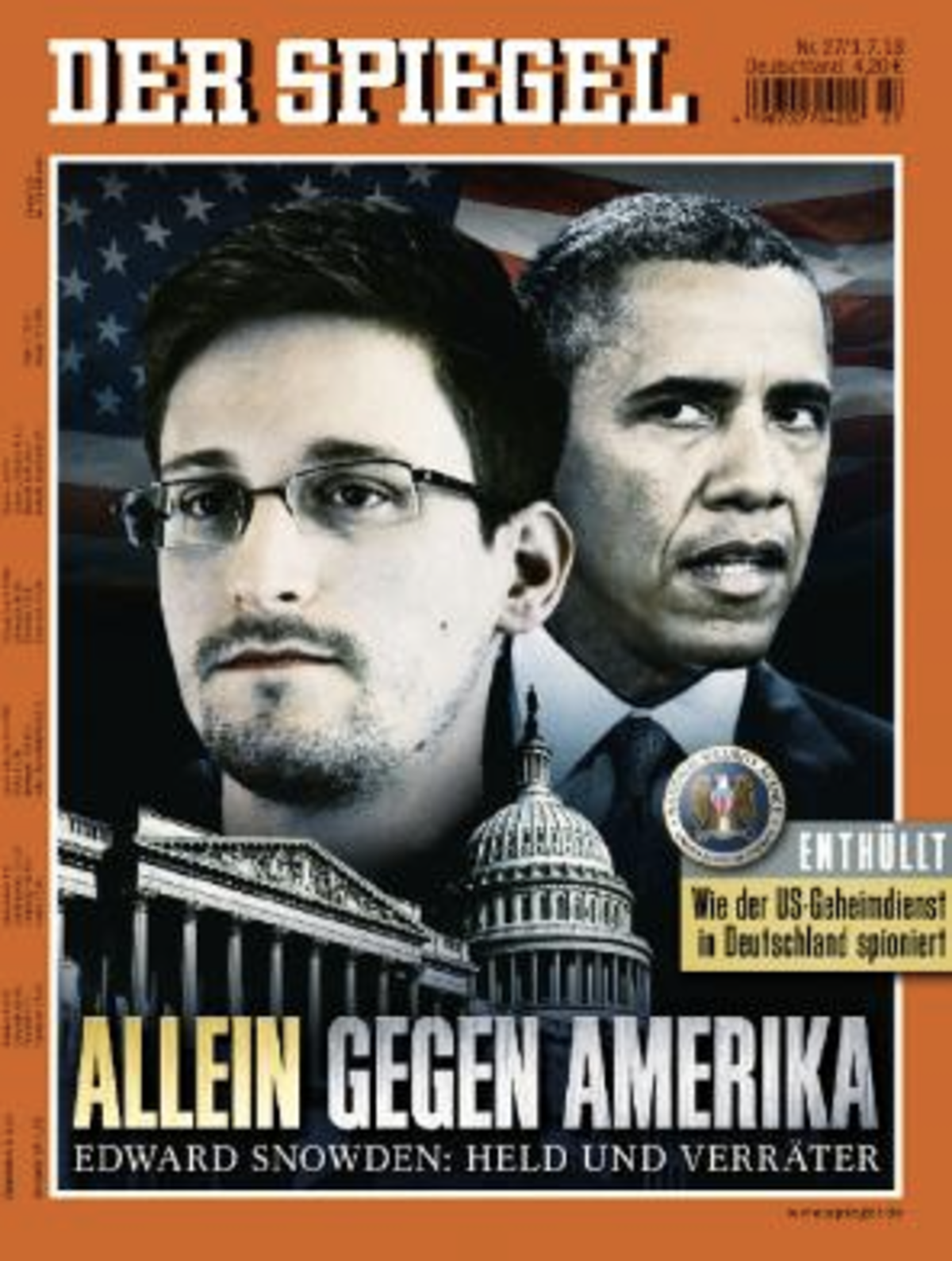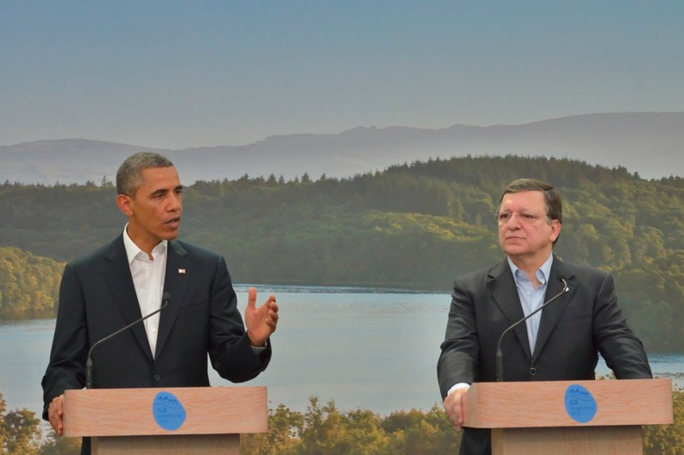The claim that the United States has been secretly spying on the European Union has provoked shock and outrage across Europe. But the tone and content of the reaction in the EU's main institutional body, the European Commission itself, has been markedly different from that in France and some other countries.
On Monday French president François Hollande was quick off the blocks, declaring that: “We cannot accept this kind of behaviour between partners and allies. We demand that this stops immediately,” he added, displaying what his finance minister Pierre Moscovici later described as “almost anger” over the affair. The president suggested that the affair could affect the imminent transatlantic trade talks due to begin between the US and Europe next week.
This link between the spying and the trade agreement was made even more explicit by the influential national secretary of the Socialist Party's overseas section, Jean-Christophe Cambadélis, who said: “The [talks] must be suspended immediately.”

Meanwhile there were calls from both Left and Right for the American whistleblower Edward Snowden, currently holed up in an airport in Moscow, to be granted asylum in France. In a statement the green movement Europe Écologie – Les Verts (EELV), which has two ministers in the government, linked the two issues of trade and asylum.
It said: “This political asylum would have a double purpose: it would make clear that France means to protect all whistleblowers whatever their nationality...and make clear that at the moment that the EU is getting ready to negotiate a transatlantic agreement with the USA, France clearly refuses the American diktat on the protection of information and the clear breaches of fundamental public liberty in the name of the fight against terrorism.”
The reaction of many Euro MPs has also been trenchant. MEPs were already due to debate the US National Security Agency's Prism surveillance system – which in the name of counter-terrorism is said to have had access to emails and other details relating to foreign users of US internet firms such as Microsoft and its Skype division, Google and its YouTube division, Yahoo and Facebook, and whose existence was revealed by Snowden – this Wednesday. The elected representatives will doubtless take advantage of the opportunity to raise the issue of US snooping on the EU both in the United States and in Brussels itself.
German Green MEP Franzisca Brantner said: “The opening of the trade negotiations must be made conditional on a prior agreement being reached between the European Union and the United States on data protection.” French MEP Guy Verhofstadt, who is head of the centrist grouping of MEPs at the European Parliament, also expressed his concern over the future of the negotiations. “I don't see how we can conclude this crucial commercial partnership while suspicions of spying persist.”

Enlargement : Illustration 2

However, the reaction from the European Commission and the EU leadership has been far more muted. As of midday on Tuesday the president of the Council of Ministers Herman Van Rompuy, who is on a tour of the Balkans, had not commented on the controversy. The president of the Commission José Manuel Barroso had also kept a low profile on the issue. Meanwhile Catherine Ashton, who is in charge of EU foreign policy and the number two at the Commission, merely issued a statement on Sunday urging Washington to “urgently clarify” the issue.
In particular EU officials have been reluctant to make any link between the spying scandal and the forthcoming trade talks. “We’re focused on the question which is the object of the allegations,” said Pia Ahrenkilde, Barroso's official spokeswoman. She refused to “speculate” what impact, if any, the spying claims would have on the trade talks, which the Commission insists is a separate issue. On 14 June EU member states gave the Commission a mandate to start negotiations with the US over a new transatlantic trade agreement, scheduled to begin on 8th July.
'The only language the Americans understand is firmness'
French MEP Arnaud Danjean, a member of the right-wing UMP and president of the European Parliament’s defence sub-committee, said he found the commission president's silence “a bit shocking”. He added: “The fact that he might be in an awkward position, I well understand, but I'd have liked him to have spoken as it's the EU's that's involved here.”
Danjean says he recalls an EU summit meeting in the Azores in 2003 – on the eve of the Iraq War – at which “Barroso showed a transatlantic logic that was both conscious and without doubt excessive”. Recently the Portuguese official, who finishes his second term of office in 2014, has been accused of wanting to force through the transatlantic trade agreement to serve his own ambitions. He is said to be interested in becoming either the next secretary general of the United Nations or the secretary general of NATO, a post that becomes vacant in 2014.
Rows such as this between the EU and the US have happened before. In the 2000s the illegal use of European customers' bank details by the Americans in the name of the war on terror led to the so-called SWIFT agreement. This was approved by the European Parliament in July 2010 at the second attempt, as MEPs had rejected a previous version earlier in the year. In July 2012, meanwhile, the European Parliament rejected the international accord on anti-piracy and counterfeiting - known as ACTA - partly over the question of the protection of people's data. “There's nothing new under the transatlantic sun,” said Marie-Christine Vergiat, a French MEP from the radical-left Front du gauche movement.
There was, meanwhile, some degree of cynicism among MEPs about how the current spying row might play out. “We Europeans will claim that we are outraged, then the Americans will act as if they were making friends with us, and all will resume as before,” the British Liberal-Democrat MEP Andrew Duff told Mediapart. “How can you have a go at the Americans for not trusting Europeans when we Europeans ourselves haven't learnt to trust each other?” he added.
In France, many politicians have followed the line that the trade talks should be put on hold until the spying issue is resolved. The Front du gauche's presidential candidate for 2012, Jean-Luc Mélenchon, said that whistleblower Edward Snowden had done France and Europe a favour. “The Americans know the contents of the European trade negotiations mandate, while we don't show them to members of parliament for reasons of confidentiality,” he said. “It would be a good thing if the tone changed, the only language the Americans understand is firmness.”
One exception to this line, especially on the Left, was junior minister for the digital economy Fleur Pellerin who said: “We must not mix the two issues. On the one hand you have a commercial negotiation about trade, and on the other an issue that is diplomatic and political.”
More problematic for the government was the call from those on the far right and radical left of French politics, plus the greens, for Snowden to be offered political asylum in France. Socialist MP and former minister Élisabeth Guigou, who is head of the National Assembly's foreign affairs committee, appeared sympathetic to that point of view, saying: “I don't believe that [Snowden's] extradition to the United States would be a good thing. I would be extremely shocked about that, knowing what we know now.” She said she wanted to see an “international agreement on the protection of whistleblowers”. Another socialist MP Christian Paul suggested that Snowden should be invited to appear before French parliamentary committees.
'What would we do with a French whistleblower...extradite them or give them a medal?'
However, reflecting the potential embarrassment that offering asylum could cause France, Jean-Christophe Cambadélis said: “This suggestion has already been made by [far-right Front national leader] Marine Le Pen. Of course, Monsieur Snowden has made revelations that are useful for the democratic world. But let's not lump everything together, because we don't know where all this could end.” President Hollande himself was at pains to point out that “we have not received any particular request coming from Monsieur Snowden...”.
The right-wing UMP has, meanwhile, remained cautious about the spying affair. Frédéric Lefebvre, an MP representing French voters overseas, particularly in the US, attacked what he called “unhealthy American-bashing starting to develop”. He said: “The suspicions of spying are not yet confirmed. We should trust the French and European diplomatic services to discuss this matter with the United States rather than the posturing of certain political leaders based on these allegations.”
However, fellow UMP member Pierre Lellouche, a former minister for European affairs and ex-president of the NATO parliamentary assembly, and currently an MP in Paris, said that he was “shocked and outraged but at the same time not surprised” by the affair. The MP said : “The issue is, when are we going to stop leaving the European Union like a defenceless marshmallow?” His view is that if “everyone eavesdrops on everyone” it is time to make progress on “European cyber-defence, which only merited a few lines in the last [government] defence white paper”.
On the trade agreement, Lellouche said that while the protests over the spying “cannot be ignored”, a commercial accord was also in Europe's own interests, to allow its members states to “penetrate the American market”. He added: “To break off these negotiations can only suit those who support protectionism.” As for offering asylum to Snowden, Lellouche advised caution. “Did we do the same thing in the days of the Soviet Union? If we found ourselves with a French person who had handed over information to Mediapart, would we ask for their extradition - or award them the Legion of Honour?”
---------------------------------
English version by Michael Streeter


